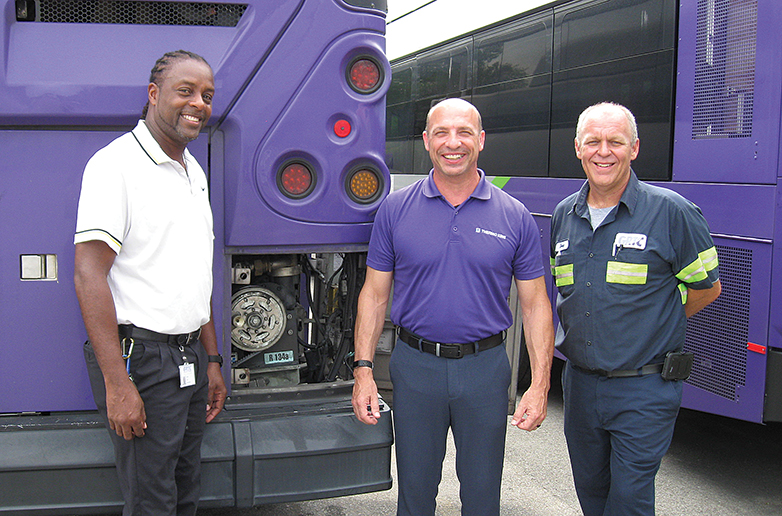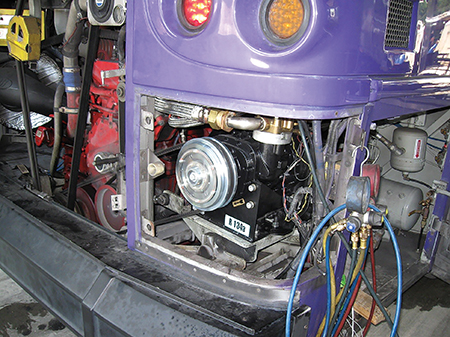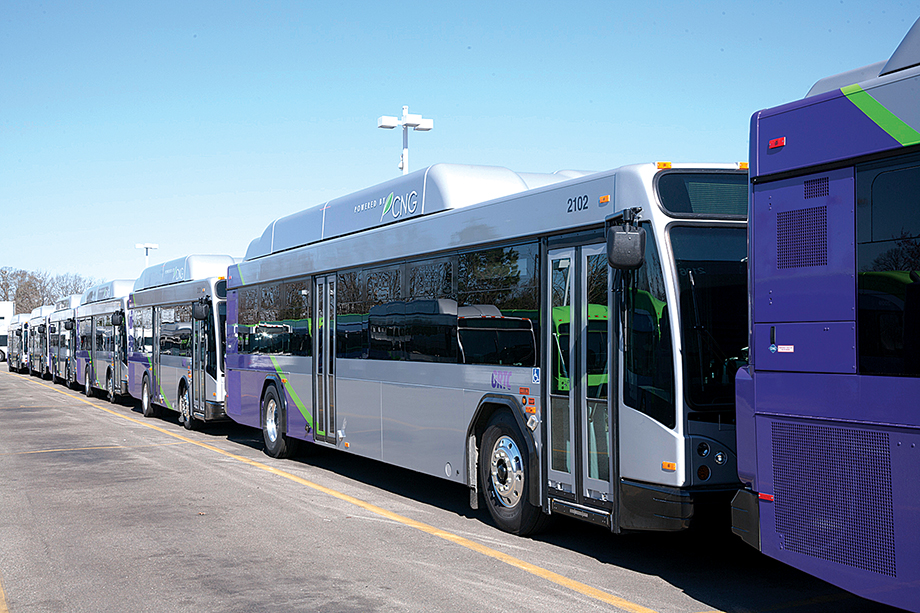
Though the technology has been used in transit buses for 18 years – with upwards of 14,000 units still in service – Thermo King’s exclusive S616 Screw Compressor technology for bus HVAC has yet to see widespread adoption in the motorcoach market. Screw compressors offer efficient operation, longer life, less maintenance and more fuel savings than reciprocating compressors, according to Steve D. Johnson, product marketing manager, bus HVAC, for Thermo King. Thermo King, based in Minneapolis, Minnesota, is an industry leader in transit HVAC, as well as in HVAC and refrigeration in other road, rail and marine industries.
Firstly, the screw compressor has 80 percent fewer moving parts than the reciprocating compressor, Johnson said. It is virtually maintenance free, and it has a higher efficiency because of the way the gas is delivered and compressed, and it has a unique unloading system which saves more fuel than its reciprocating counterpart.

“This compressor unloads by literally controlling the amount of gas needed to compress,” Johnson said. “So, it takes horsepower right away from the engine. It has three levels of unloading: 100 percent, 66 percent, and 33 percent. It is perfect for a coach application, where vehicle doors remain closed for long periods of time. As the bus cools down, the compressor goes into the 33-percent loaded position – effectively allowing a vehicle to run for hours at that level, saving fuel.”
Johnson said that, as Thermo King looks to enter into the coach market with this technology, testing is critical. Coaches are built much differently than transit buses. In speaking with end-users, Johnson said that many operators have significant issues with their current compressors, but replacing them must be done directly through their vehicle’s OEM.
“That creates issues with their warranties, and with possible warranty cancellation,” he said. “So, they mostly just stick with the compressor they’re given.”
However, users have expressed interest in trying a better solution.
Thermo King decided the best strategy was testing the screw compressor, which will run within operate with any other vendor’s system, with a partner company or agency that could realize the benefits firsthand.
Enter GRTC
Thermo King found a willing partner in the Greater Richmond Transit Company (GRTC), already a trusted partner for transit HVAC. GRTC provides fixed route and express route service, as well as the specialized services CARE, C-Van and Ridefinders, to the Richmond, Virginia, area and parts of the surrounding Chesterfield and Henrico counties. Its 244 buses and vans service 32 local routes, nine express routes, and one rapid transit line.
In May 2016, Thermo King outfitted a GRTC-owned MCI coach, normally used for a dedicated 300-mile round trip route daily during the summer months, with a mix of highway and stop-and-go duty , with the S616 screw compressor.
Training, Johnson said, was minimal for the experienced team at GRTC. With some diagnostics manuals and a two-hour session with Thermo King trainers, the compressor was ready to go.
“The compressor is really the heart, the pump, and so there’s not a lot of training required to be able to use that compressor,” Johnson said. “But their staff is one of the best, and they took to it right away.”
“I’ve got a lot of people’s phone numbers at Thermo King, so if I run into a problem, all I have to do is call them,” said Doug Bauserman, master technician for GRTC. Bauserman has worked at the agency for 32 years and is one of the agency’s most trusted technicians. “They’re always very responsive and quick to help.”

Testing the screw compressor
“Thermo King came down and paid to retrofit our bus,” Bauserman said. “It’s working well, and we’ve had very little trouble out of it.”
In 2017, GRTC pulled the following data comparisons from their compressors. In the trial shown, both buses operated on the same routes – a combination of interstate and city stop-and-go, with the same Cummins engine and Allison transmission powertrain.
During July 2017:
Bus 1504 with the screw compressor traveled 4,812 miles and used 914 gallons of fuel for 5.263 mpg.
Bus 1505 with a reciprocating compressor traveled 5,184 miles and used 1,062 gallons of fuel for 4.881 mpg.
During August 2017:
Bus 1504 with the screw compressor traveled 5,070 miles and used 988 gallons of fuel for 5.132 mpg.
Bus 1505 with a reciprocating compressor traveled 5,208 miles and used 1,061 gallons of fuel for 4.909 mpg.
Over time, GRTC reported a 7 percent improvement in fuel economy compared to the current configuration with no cooling complaints and no out-of-service issues.
“The compressor has worked very well for us, and we have only had one small problem since the conversion was done,” said Tony Byrd, assistant director of maintenance for GRTC, and an agency employee for over 30 years. “In the initial installation, there was a leak at the line connection to the compressor. Once that was corrected, it’s been maintenance free.”
Johnson said that Thermo King is confident that opportunities for fuel savings are even greater when measured over a longer time period. The compressor was designed to last the life of the bus and transit operators have realized this value.
“GRTC has been an incredible partner as we test and develop this technology’s capabilities in an entirely new bus application,” Johnson said. “In our business, with the thousands of miles traveled by these vehicles every day, a 5 to 7 percent in fuel savings is significant. Combine that with the maintenance savings and the improvement in asset utilization (less down time), the retrofit will pay for itself in a couple of years. Agencies will use these buses up to 15 years.”
